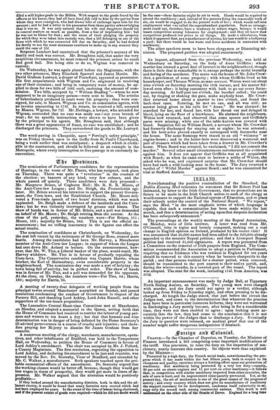IRELAND.
Notwithstanding the positive contradiction of the Standard, the Dublin Evening Mail reiterates its statement that Sir Robert Peel has intimated, by letter to the Irish Government, that no promotions are in future to be made in the Irish Church unless to such of the clergy as would consent to support the National system of Education, and to place their schools under the control of the National Board. " We repeat," says the Mail, " in the most emphatic terms of which language is capable, that such a communication has been made within the last month, and that a determination of acting upon that despotic declaration has been subsequently announced."
The proceedings at the weekly meeting of the Repeal Association, on Monday, were of little interest. A letter was read from Mr. O'Connell, trite in topics and loosely composed, making out a vast change in English opinion on Ireland, produced by his recent visit! It was announced that 26,000 names had been added to the 820,000 already appended to the monster Repeal petition ; and that a Liverpool Repeal petition had received 31,000 signatures. A report was presented from a Committee on the removal of Irish paupers from England. The Com- mittee recommended the Association to adopt a petition to Parliament, requiring that no Irishman who was resideut in England for ten years should be removed to this country when he became chargeable to the parish ; and that persons resident for a shorter period, when removed, should be transmitted to the port nearest to their native parish, and, during the winter-months, in a covered part of the vessel. The report was adopted. The rent for the week, including 1141. from America, was 3701.
An important announcement was made by Judge Ball, at Tipperary North Riding Assizes, on Saturday. Two young men were charged with murder, and the Jury could not agree to a verdict, although locked up from Friday to Saturday night, and often pressing to be dis- charged. At length the Judge stated, that just before the circuit the Judges met, and came to the determination that whatever the practice may have been in particular instances hitherto, they were not warranted in discharging a Jury merely because, after being in for a considerable time, they were not then enabled to agree : upon looking more ac- curately into the law, they had come to the conclusion that it is not within the power of the Judges thus to discharge a Jury. Eventually the Jury in question were released, on medical proof that one of the number might suffer dangerous indisposition if detained.


























 Previous page
Previous page